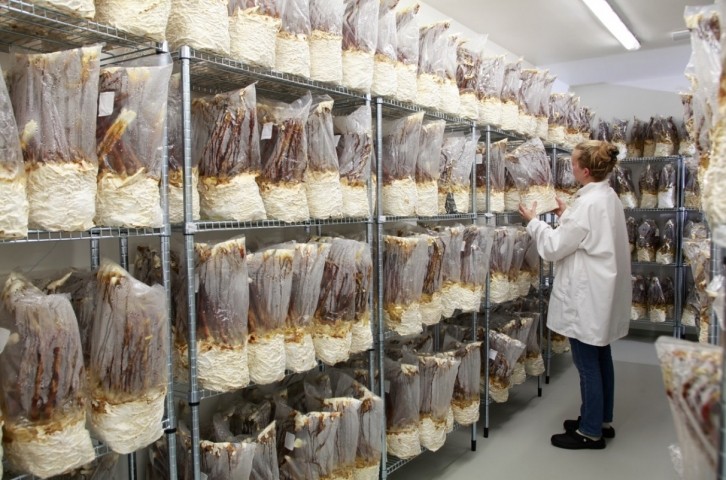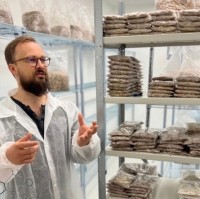KÄÄPÄ Biotech in €3.5m scale-up to keep up with mushrooming demand

The five-year-young Finnish biotech firm has secured €2.5 million from two ethically-aligned investors - Applied Food Sciences (AFS), a North American functional ingredients supplier and HL Hall and Sons Group, a fresh produce importer moving into the nutraceuticals arena - and taken on an additional €1 million in debt in order to finance required expansion of its transparent, organic production line.
The firm's supply chain is fully controlled from ‘spore to extract’, providing much needed trust and quality which has previously been severely lacking in this market.
“Many of the suppliers of these ingredients aren’t trusted and the regulatory system hasn’t caught up but when clients come to our factory and see
our production, they know for sure they are getting what they are told,” explains founder and CEO Eric Puro.
The entrepreneur says, as well as his firm's strong ethos, winning the NutraIngredients startup award in 2021 played a large part in securing investment.
“The Startup of the Year Award really was crucial to us leveraging private equity to grow the company and to convince investors that they should trust us, so NI played a huge part.”
The €3.5m total investment will be used to acquire a new factory, a 300kg freeze dryer, and increase capacity across its manufacturing line.
The firm has doubled its forestry coverage in the last three years, taking its Chaga mushroom growing division from 250 to 500 hectares of forest, making it the world’s largest Chaga growing entity.
The team produces this variety of mushroom through a sustainable process which aims to stem some of the potential damage that could be done through other foraging techniques currently used around the globe.
They work with forest owners in Finland inoculating live birch trees that need to be cut down. Once the Chaga has grown and the tree needs to be cut down, they harvest the Chaga, and then if the forest owner chooses they can inoculate tree logs with rare and endangered fungal species which they lay down on the ground to add essential nutrition to top soil.
"The forest owners buy the materials from us and then we buy the mushrooms back from them, exclusively.”
Beyond the Chaga division, the firm uses ‘grow rooms’ to produce their extensive range of mushrooms, allowing them to control the conditions to more precisely maximise the bioactive components and standardise products to the metabolites of interest.
The mushroom market
Whilst fungi are powerhouses of health, Puro asserts that the key benefits of interest to consumers today are those relating to sleep, stress, immune health, cognition, and focus.
In fact, Puro reveals that 50-60% of the firm’s sales are Lion’s Mane, which is best known for it’s cognitive health benefits.
“Lion’s Mane activates NGF [nerve growth factor] production which has been shown to decrease depression, increase neurocognition and memory.”
He says his firm has just completed a human clinical trial on the cognitive health benefits of the mushroom, set to be published in the next few months, and has another three to four studies in the pipeline to be conducted over the next year.
Whilst he did predict that adaptogenic mushrooms would see a rise in consumer interest in Europe at the company's inception, Puro plays down the exceptional timing of the firm being launched in tandem with the growth of the key consumer trends - sustainability, transparency, botanicals, immunity and cognitive health.
“We got really luck that we were inspired by fungi five or six years ago and today this is a mass market interest.
"The mushroom space is just growing massively.”
What he couldn't have predicted, is the number of brands moving out of CBD and into mushrooms, in response to regulatory barriers.
"In the UK, Finland, and other European countries, the regulatory environment is OK right now but we don't know what's going to happen and mushrooms have a solid status with EFSA so it's a good place to diversify.
"We see a lot of brands in women's health and sleep which are trying to find replacements to CBD. The Reishi mushroom, which helps with nervous system support, relaxation and sleep, is a popular replacement."
Future of fungi
Discussing potential future trends for the market, Puro says he is seeing a growing number of nutraceutical brands utilising these botanical powerhouses, for their anti-oxidant and anti-inflammatory potential.
He says the range of products his ingredients are utilised within really reveals the huge diversity of the plants: “There’s one company in Finland using our ingredients for a men’s beard cream!”
But he is most excited about the sports performance space.
“Cordyceps offer benefits in vasodilation, to improve VO2 max. So we’ve started working with professional football clubs, working with their trainers to test these products with their athletes and we’ve been seeing these guys breaking personal records.
“Sports performance is a really interesting space because these people are really testing themselves and they have a really high bar when it comes to what supplements they will continue to take. It’s a great challenge I am excited to take.”
Discussing his ‘hopes and dreams’ for the market, he says he believes there is huge opportunity for mushrooms to be utilised in clinical settings to help with the global issues of rising healthcare costs, especially with the rising interest in preventative healthcare solutions from bureaucrats across the globe.
“Spain is a country that is ahead of the curve. I’m astounded to see what’s happening there. Doctors are using Lion’s Mane on patients with dementia and patients with serious cognitive disabilities and they are getting positive results.
“It’s a market we’ve left to the pharmaceutical industry so far but I’m excited to see what our industry can do.”






